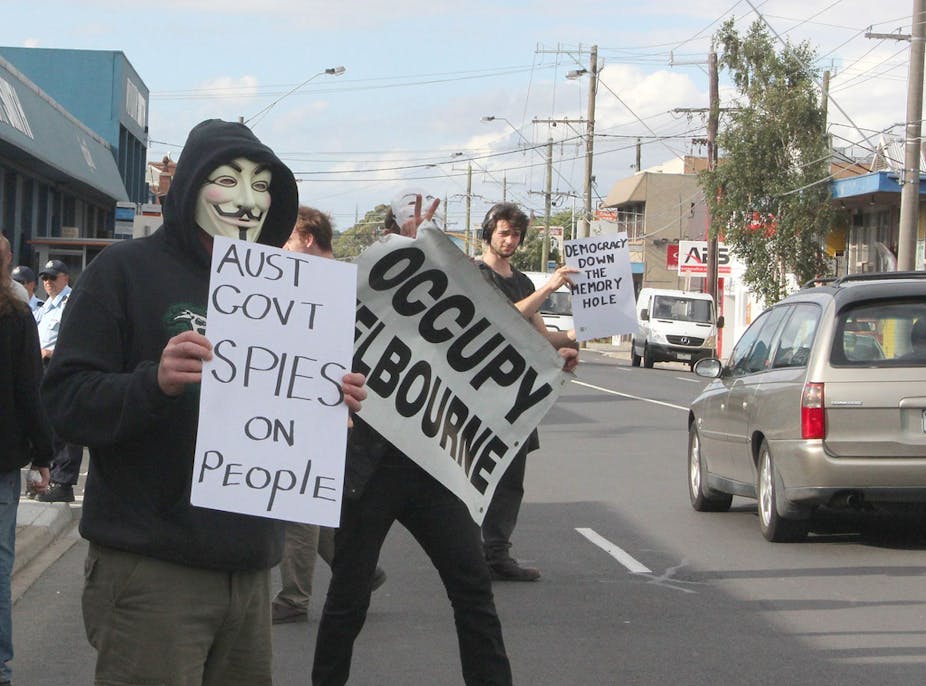Revelations about Australia’s alleged spy network in Asia and listening posts in our embassies across the Pacific might be diplomatically awkward. But it doesn’t mean intelligence agencies have “gone rogue”.
Nor should it come as any great surprise, especially to many of the high-level political targets. States spying on each other is an old, entrenched political game. The fact that intelligence stations exist in embassies and high commissions abroad to intercept phone calls and gather data has long been a poorly kept secret.
Secrecy and surveillance is, and will continue be, a legitimate part of the intelligence bottom-line. Policymakers need to make informed strategic decisions. Data also needs to be gathered to assist tactical operations. The gathering of such information, while deceiving enemies, will to some degree be dependent on sensitive secrecy arrangements.
Protecting populations or protecting rights?
Intelligence collection is a controversial business. Citizens are rightly wary of arbitrary and unaccountable government power and demand due process, accountability and human rights.
It is clear that one of the real fall-outs is a general loss of faith by individuals and civil societies in the competence and integrity of their nation’s security sector. Many of these wounds have been self-inflicted by governments. The political manipulation of intelligence led to exaggerated assessments of Iraq’s weapon capabilities. Drones. Assassinations. Sweeping and unnecessary new counter-terrorism legislation. The actual scale and extent of modern-day intelligence collection.
The list goes on and on, so it’s not hard to understand why people are cynical or concerned.
But the existence of various forms of secret surveillance in itself should not be automatically equated with security systems that are irreparably broken or an ingrained culture that is immoral and corrupt. Not all intelligence functions are inevitably abusive.
Yet one of the central dilemmas is that the equation of intelligence “success” does remain highly subjective. It is very difficult to test the veracity of political claims pointing to security/intelligence “breakthroughs” about real or imagined foes. At the same time, media and academic focus does tend to fixate on intelligence failure rather than its successes.
Further, how do we best match public expectations with the actual benefits, as well as limitations, of intelligence? The challenge is to devise a set of parameters to help to discern the degree of necessary secrecy that is required for effective intelligence. In short, what are legitimate and illegitimate standards of secrecy? The irony, of course, is that thorough investigations will be hindered by secrecy barriers.
Nonetheless, we are well past our tolerance for political promises to “just trust us”. But knee-jerk calls for radical reforms – including naive Julian Assange-type appeals for complete transparency and even the elimination of such agencies - can miss the mark in dealing with questions regarding the quality of our security systems and the value, nature and impact of intelligence and law-enforcement activities.

The changing shape of intelligence
After the tragic events of 9/11, citizens expected leaders to act in a tough, proactive manner. The public mood did spur governments to “do something”, often packaged with a dramatic and determined resolve, to prevent future strategic surprises.
Individuals also express some willingness to sacrifice political and civil liberties for a perceptions of greater security and being safer from harm. However, endless threats to human safety were also too often exaggerated and over-played in an ambitious, apocalyptic fashion.
So did we over-react to 9/11? No doubt, our collective panic caused missteps and miscalculations. Perhaps more disturbingly was the extent to which citizens were prepared to take short-cuts in the rule of law and to turn a blind eye to immoral practices (such as torture) as long so they felt it would be directed to “the other” – mainly Arab and Muslim communities.
Overall, what we have witnessed over the past decade is a counter-terrorism framework closely ingrained with improving state capacity in the fields such as investigation and surveillance. The spotlight of expectation had been thrust on the executive branch of government, with the prevailing attitude that the “gloves had to come off”. As such, we have seen the growth of executive power and the ramifications of executive overreach (and an over-reliance on GI Joe mindsets).

Simultaneously, this political setting has coincided with rapid changes in technological innovation. Mass surveillance, and the control of data, has never been easier or more elementary. The sheer scale of the current data sweeps is huge and everyone today is leaving a digital footprint.
Nevertheless the intelligence community is not anarchic. While they will push boundaries, they have been generally following political directions and the expected practises of their political masters. And some level of activity – without public awareness - remains justifiable.
We have now entered the surveillance age. This snooping is ubiquitous. Both governments and corporations, and growing partnerships between the two, have embraced new standards in the collection, analysis and storage of data. Some serious thinking lies ahead about our next steps: will this lead to greater self-censorship? Is data stored securely? What are the privacy implications?
Secrecy is both indispensable and perilous. One of more interesting questions remains around what are the necessary and legitimate levels of secrecy required for the effective functioning of our security agencies – such as preventing terrorism?
A valuable element of discussions should therefore be based around the idea of valid secrecy arrangements, the need for proportional political and public responses, the importance of oversight and the related paradoxes of programs such as mass surveillance.

